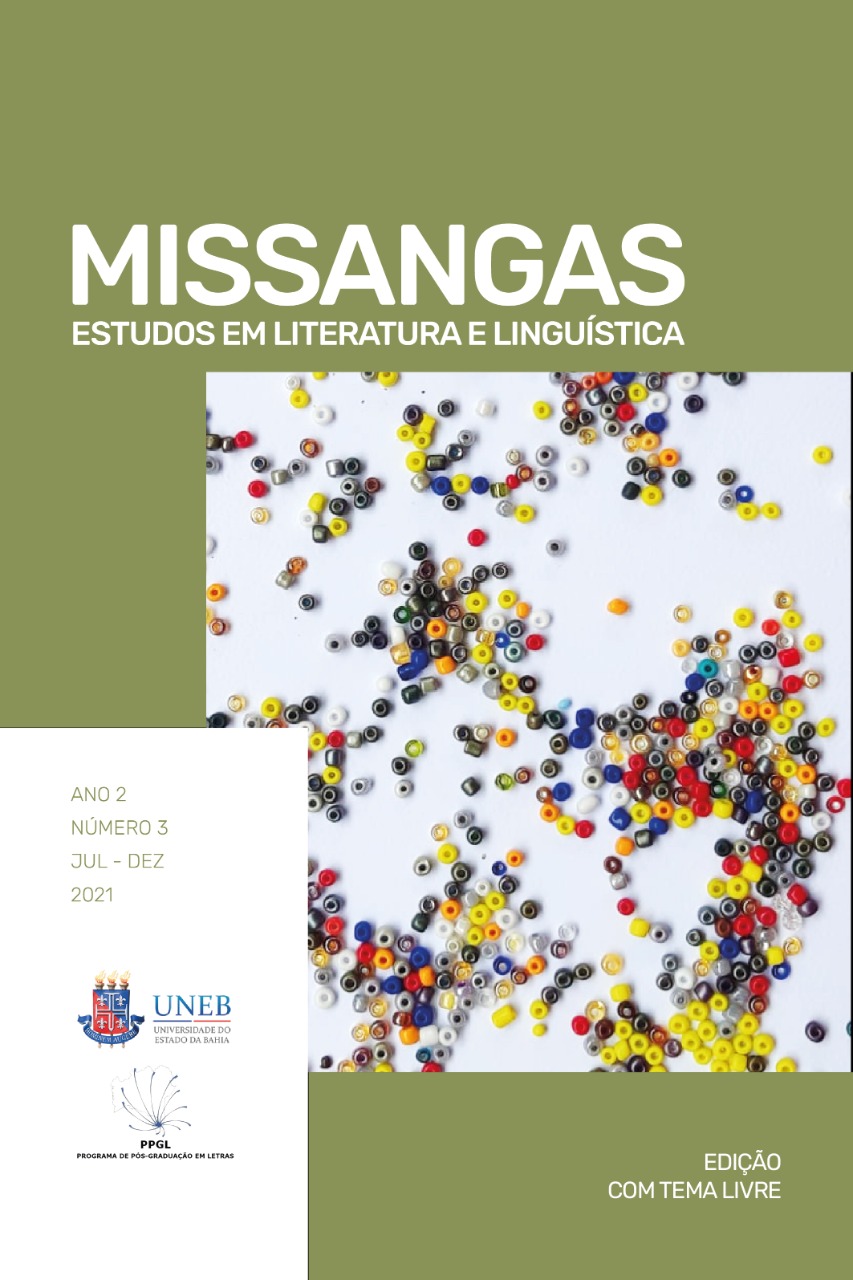A LINGUAGEM NO GUIA DIGITAL PNLD - 2020 - LITERÁRIO (PDF)
DOI:
https://doi.org/10.53500/missangas.v2i3.12645Keywords:
Guia PNLD - Literário; Ensino de língua; Diversidade linguística.Abstract
Abstract: this article presents an analysis of the language of the e-book Guia PNLD 2020 - Literary Works (PDF) and aims to identify the linguistic policy present in the selected corpus: whether or not it reproduces the universalist idea of erasing cultural and linguistic differences, in order to identify what type of discourse is offered to teachers, in the selection of national and foreign works, and to Fundamental Education students in public schools. It is possible to observe how the look at multicultural and multilingualism manifests itself (GUIMARÃES, 2005, p. 22) in the context of teaching the mother tongue of Brazil, in the context of national linguistic diversities and migration. The analysis methodology, the documentary, is based on discourse analysis (BAKHTIN, 2010, 2015, 2016). It is concluded that the look at diversity is present in the corpus, with more space for multicultural than for multilingualism (PUH, 2020), and whose levels of erasure occur more effectively in the text body of the document due to the the lack of expressiveness for a terminology that directly refers to them, a possible effect of the absence of a systematization of linguistic policies that give more invisibility to differences (PUH, 2020) and that guide teachers to reflect on issues of linguistic diversity in the choice of literary works.
Downloads
References
BAKHTIN, Mikhail M. Os gêneros do discurso. Tradução: Paulo Bezerra. São Paulo: Editora 34, 2016.
BAKHTIN, Mikhail M. Para uma filosofia do ato responsável. Tradução: Valdemir Miotello e Carlos Alberto Faraco. São Carlos: Pedro & João Editores, 2010.
BAKHTIN, Mikhail M. Problemas da poética de Dostoiévski. Tradução: Paulo Bezerra. São Paulo: Editora 34, 2015.
BARZOTTO. Valdir H. Leitura de Revistas Periódicas: forma, texto e discurso. Um estudo sobre a revista Realidade (1966-1976). Tese de Doutorado. Instituto de Estudos da Linguagem/UNICAMP, 1998.
BRASIL. Fundo Nacional de Desenvolvimento da Educação. Conselho deliberativo. Ministé-rio da Educação. Resolução nº12, de 07 de outubro de 2020. Dispõe sobre o Programa Nacio- nal do Livro e do Material Didático –PNLD, Brasília, 07 out. 2020. Disponível em: < https://www.fnde.gov.br/index.php/acesso-a-informacao/institucional/
legislacao/item/13844-resolu%C3%A7%C3%A3o-n%C2%BA-12,-de-07-de-outubro-de-2020 >. Acesso em: 26 out. 2020.
ESTUPIÑÁN, Mireya C.; BERMÚDEZ, Miguel Á. M. Enseñanza de las lenguas en Colombia desde una perspectiva glotopolítica. Cuadernos de Lingüística Hispánica, n°. 35, Enero-Junio 2020, pp. 181-206.
FUNDO NACIONAL DE DESENVOLVIMENTO DA EDUCAÇÃO - FNDE. Ministério da Educação. Programas do livro. 2020. Disponível em: <https://www.fnde.gov.br/index. php/programas/programas-do-livro/pnld/escolha-pnld-lit-2020>. Acesso em: 26 out. 2020.
GUIA DIGITAL PNLD (2020) Literário, 2020. Disponível em: < https://pnld.nees.ufal.br/pnld_2020_literario/inicio >. Acesso em: 22 out. 2020.
GUIMARÃES, Eduardo (Coord.). Línguas do Brasil. Ciência e Cultura (Temas e Tendência), São Paulo, v. 57, n. 2, p. 22 - 25, abr./jun., 2005.
PNLD Literário 2020: tudo sobre o programa. Disponível em: < https://www.edocente. com.br/pnld-literario-tudo-sobre-o-programa/ >. Acesso em: 20 out. 2020.
PUH, Milan. “Tudo junto e misturado?”: as contribuições e os limites do multiculturalismo no ensino de línguas. El toldo de Astier. Propuestas y estudios sobre enseñanza de la lengua y la literatura. Cátedra de Didáctica de la lengua y la literatura I. Depto. de Letras. Facultad de Humanidades y Cien- cias de la Educación. Universidad Nacional de La Plata. ISSN 1853-3124. Año 11, Nr.º. 20-21, julio de 2020. pp. 415-432. Disponível em: <http://www.eltoldodeastier.fahce.http://www.eltoldodeastier.fahce.unlp.edu.ar/ numeros/ numero20/pdf/Puh.pdf>. Acesso em: 10 set. 2020.
ROSSI-LANDI, Ferruccio. II A linguagem como trabalho e como mercado. In: A linguagem como trabalho e como mercado: uma teoria da produção e da alienação linguísticas. São Paulo: Editora DIFEL, 1985. p. 63 - 105.
SCHLIEBEN-LANGE, Brigitte. Trad. Fernando Tarallo et. al. História do Falar e História a Linguística. Campinas Editora da UNICAMP, 1996.
Downloads
Published
Issue
Section
License
Os artigos publicados na revista Missangas são de inteira responsabilidade de seus autores e não refletem, necessariamente, o pensamento dos editores.


